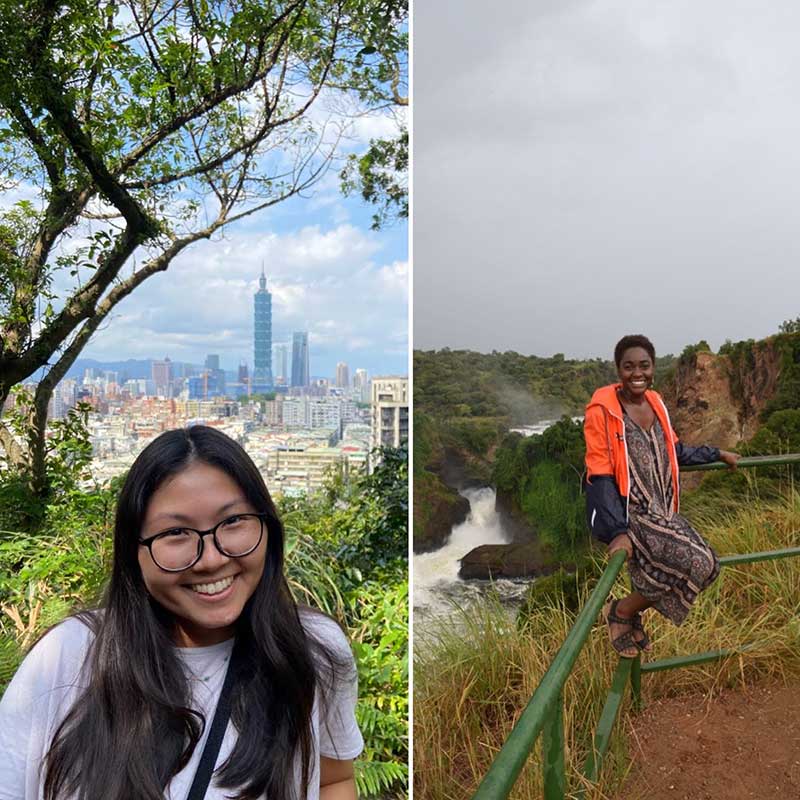
The Foundation is proud to have two Robertson Fellows taking part in the Boren Fellowship Program, through which scholars immerse themselves in cultures and study critical languages around the world.
Kelli Sunabe (Maxwell, ‘23), is currently completing her Boren Fellowship in Taiwan where she is studying Mandarin and JaKyah Beatty (UMD SPP, ‘24) has been accepted as a Boren Fellow to study Swahili in Tanzania this Fall.
Sunabe, who spent time in the People’s Republic of China (PRC) as a Peace Corps volunteer, achieved some proficiency in the language, but applied for the fellowship because she wanted to achieve a higher Mandarin Chinese proficiency. “The influence of the PRC and the Republic of China (Taiwan) on other actors around the world is a factor that I believe can be better understood through cultural, historic, and linguistic traditions,” Sunabe explains.
Beatty tells of how travels abroad in undergrad led her to pursue a Boren Fellowship. While you might not immediately see the connection between global development and fashion merchandising, Beatty says it became evident during her junior year while studying abroad in Italy. “We participated in several global workshops in and around Italy, London, and Paris. The traveling projects taught us about sustainability and ethics in the fashion industry – from organic cotton farming to sweatshops and labor ethics in garment factories in developing countries. I was deeply inspired to learn more about how the apparel industry’s outsourcing influences developing countries and local economies.”
Beatty continued to build on that experience and started to work for a social enterprise in Uganda, focused on economic development by employing women to produce apparel sold in the U.S. and Canada. Her work led her to partner with two local Ugandan men, and develop a community organization providing education, professional development and alternative sources of income to women who previously worked in prostitution.
“Working with them taught me that sustainable development is more than just providing a job; it is teaching, supporting, and equipping individuals to create their opportunities and organizations,” Beatty elaborates. “I also realized that the field of international development lacks diversity. I was the only Black American out of about 60 expats working in different organizations around Gulu, Uganda, and the only African American of the 30 plus past employees who had worked with the same social enterprise that I had. These experiences were impactful enough to push me to pursue work in international development.”
Beatty hopes to build on this experience as a Boren Fellow. “I am interested in learning Swahili through the Boren Fellowship program because I deeply enjoyed my time in East Africa. I have learned so much since I spent time there after undergrad and would love to return with my increased knowledge of development and policy.”
Beatty hopes to use the experience to build on her career in public service, and to work in the Foreign Service as a Public Diplomacy Officer or Economic Officer.
“The Public Diplomacy Officer position interests me because it entails building bridges of understanding between Americans and the world. As a Peace Corps Volunteer, a large portion of our role was to share American culture with our communities and learn their culture to bring home and share with Americans. I believe that developing mutual cultural understanding is imperative to continuing strong foreign policy and foreign relations. I am also interested in the Economic Officer position as it involves working with other countries on environmental issues and promoting economic development in underdeveloped or newly emerging countries.”
Sunabe has also used her time as a Boren Fellow to increase her language skills and sees a long-term impact on foreign policy.
“While the PRC and Taiwan share the same language, there are some divergences in various vocabulary, phrases, cultural references, etc. By the end of my fellowship, I hope to offer a more informed interpretation of word usage and its corresponding meaning for governmental policies, political rhetoric, and citizens’ perspectives on geo-politics.”
As they continue with this exciting new opportunity, both Beatty and Sunabe are grateful for their experiences with RFG.
“I have had the pleasure of working with the RFG staff who have been excellent in helping me choose fellowships and internships to apply for,” Beatty explains. “I have also enjoyed networking and hearing advice from the RFG alumni network virtually and in person.”
For Sunabe, “RFG has given me the means to pursue a career in public service. Throughout my graduate school career, they have provided extensive Federal Government career pathway training and events and special cross-governmental agency event opportunities; introduced me to a close-knit Alumni community; and actively encouraged me to pursue various internship and job opportunities. The RFG team ensures Fellows, including myself, have a smooth transition into a career in public service.”
For both women, they are eager to have careers in public service and to continue building upon U.S. international efforts.
“I hope to participate in a public service career that values the positive impact of U.S. bilateral and multilateral engagement and the capability for communities across continents to empower groups of people despite socio-economic and cultural barriers,” Sunabe states.
For Beatty who is about to embark on her Fellowship, she looks forward to a career dedicated to empowering people and improving systems that ultimately will influence the quality of life offered by the U.S. and other countries worldwide. In addition, I love learning about new cultures and problem-solving, so a career in foreign service and international development is something that genuinely interests me.”